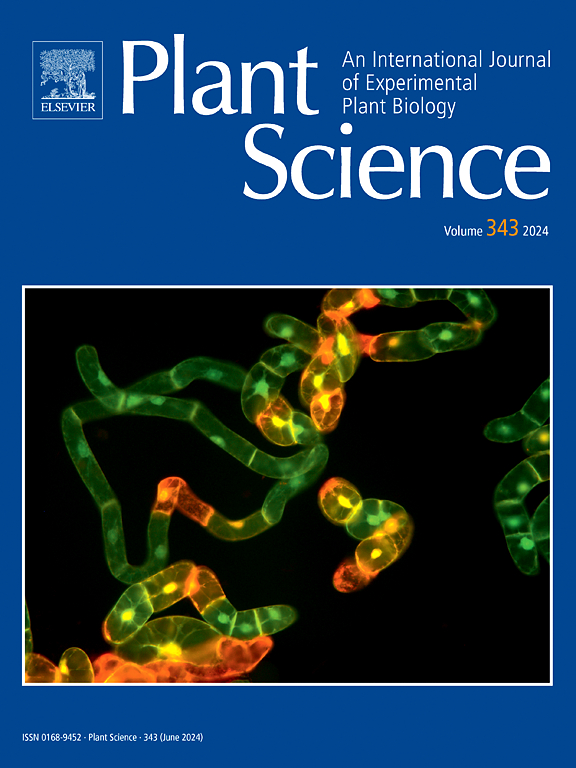Inheritance of resilience: genetic Mapping of transgenerational and intergenerational drought stress memory in wheat
IF 4.2
2区 生物学
Q2 BIOCHEMISTRY & MOLECULAR BIOLOGY
引用次数: 0
Abstract
Drought stress is a critical challenge for global wheat production, threatening food security by reducing crop yields and quality. The ability of wheat to adapt to and survive under drought conditions is largely dependent on its genetic makeup. Therefore, understanding the genetic associations controlling the effects of intergenerational and transgenerational stress memory underlying drought exposure histories in a diverse collection of 111 wheat accessions using a genome-wide association study (GWAS) plays a significant role in sustaining yields. In this study, we conducted a comprehensive comparison between seeds from the second-generation group that were not subjected to drought stress (C1C2) and seeds from groups that experienced drought stress in one generation, either two generations prior (D1C2; transgenerational drought memory) or in the preceding generation (C1D2; intergenerational drought memory). Additionally, we analyzed seeds from the group exposed to drought stress in both generations (D1D2; combined drought memory). Our findings reveal that historical exposure to drought stress, irrespective of the specific generational context, led to significant alterations in several key plant characteristics, including spike length, the number of spikelets per spike, grain number per spike, grain weight per spike, thousand kernel weight, and levels of both enzymatic and non-enzymatic antioxidants. These results suggest that previous encounters with drought stress impart a lasting impact on the plant, potentially priming it for altered responses under future stress conditions. Using GWAS analysis, we identified highly significant associations and candidate genes associated with most of the traits evaluated, highlighting the genetic underpinnings that may drive these stress memory effects. Interestingly, the candidate gene TraesCS2A02G432800 on chromosome 2 A mapped as Leucine-rich repeat protein 1 (LRR) that harbors the variation of all the agronomical traits for the wheat genotypes that experienced drought stress over three generations. LRR proteins are involved in various physiological processes, including stress response, making them key players in the adaptation of wheat to drought stress. This research underscores the importance of understanding environmental stressors' transgenerational and intergenerational impact on crop performance, with potential implications for breeding and agricultural resilience.
小麦抗旱记忆的跨代和代际遗传定位
干旱胁迫是全球小麦生产面临的重大挑战,它通过降低作物产量和质量威胁粮食安全。小麦适应干旱和在干旱条件下生存的能力在很大程度上取决于其基因组成。因此,利用全基因组关联研究(GWAS)了解控制干旱暴露历史下代际和跨代胁迫记忆影响的遗传关联,对保持产量具有重要作用。在本研究中,我们对未遭受干旱胁迫的第二代群体(C1C2)和在一代或两代之前经历过干旱胁迫的群体(D1C2;跨代干旱记忆)或上一代(C1D2;代际干旱记忆)。此外,我们还分析了两代(D1D2;组合干旱记忆)。我们的研究结果表明,历史上暴露于干旱胁迫下,无论特定的世代背景如何,都会导致几个关键植物特性的显著改变,包括穗长、每穗颖花数、每穗粒数、每穗粒重、千粒重以及酶和非酶抗氧化剂水平。这些结果表明,以前遇到的干旱压力对植物产生了持久的影响,可能使其在未来的压力条件下做出改变的反应。通过GWAS分析,我们确定了与大多数被评估性状相关的高度显著的关联和候选基因,强调了可能驱动这些应激记忆效应的遗传基础。有趣的是,2号染色体 A上的候选基因TraesCS2A02G432800被定位为富含亮氨酸重复蛋白1 (Leucine-rich repeat protein 1, LRR),该基因承载了经历干旱胁迫的小麦基因型在三代内所有农艺性状的变异。LRR蛋白参与多种生理过程,包括胁迫反应,是小麦适应干旱胁迫的关键分子。这项研究强调了了解环境压力源对作物性能的跨代和代际影响的重要性,并对育种和农业恢复力具有潜在的影响。
本文章由计算机程序翻译,如有差异,请以英文原文为准。
求助全文
约1分钟内获得全文
求助全文
来源期刊

Plant Science
生物-生化与分子生物学
CiteScore
9.10
自引率
1.90%
发文量
322
审稿时长
33 days
期刊介绍:
Plant Science will publish in the minimum of time, research manuscripts as well as commissioned reviews and commentaries recommended by its referees in all areas of experimental plant biology with emphasis in the broad areas of genomics, proteomics, biochemistry (including enzymology), physiology, cell biology, development, genetics, functional plant breeding, systems biology and the interaction of plants with the environment.
Manuscripts for full consideration should be written concisely and essentially as a final report. The main criterion for publication is that the manuscript must contain original and significant insights that lead to a better understanding of fundamental plant biology. Papers centering on plant cell culture should be of interest to a wide audience and methods employed result in a substantial improvement over existing established techniques and approaches. Methods papers are welcome only when the technique(s) described is novel or provides a major advancement of established protocols.
 求助内容:
求助内容: 应助结果提醒方式:
应助结果提醒方式:


